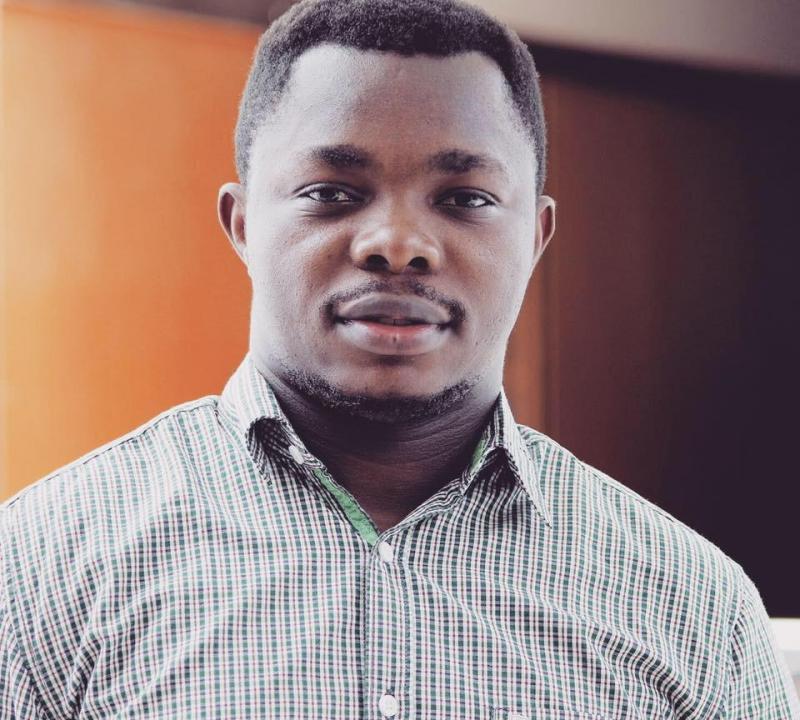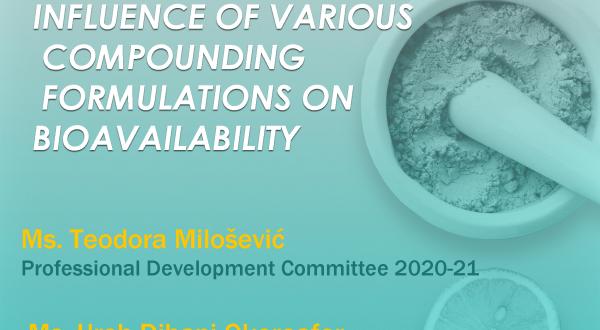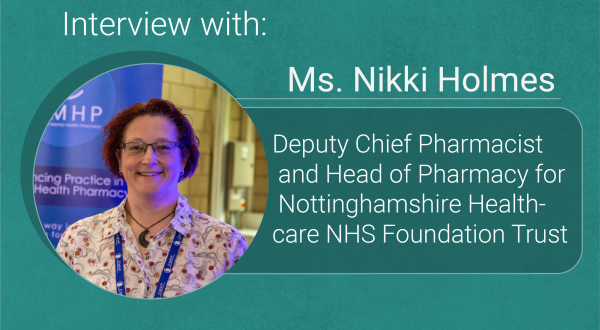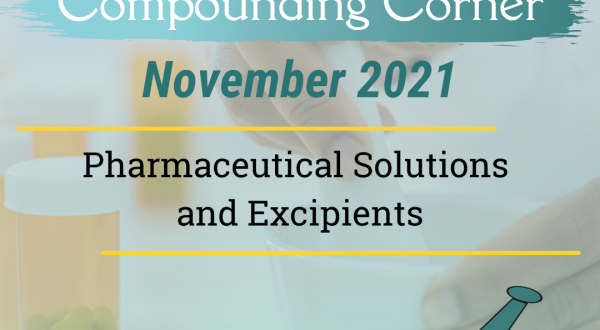
AfRO Shines A Light On Pascal Mongane
In this edition of AfRO SHINES A LIGHT, we spoke with Congolese pharmacist, Pharm Pascal Mongane, a global health leader with keen interests in pharmaceutical policy, regulation and education. He has vast volunteering experiences, having volunteered with the African Union (AU), Inclusion International, IPSF and FIP. It was a delightful pleasure to learn from his wealth of experience. Do enjoy.
IPSF-AfRO: Good day, Pascal. Thank you so much for granting us this interview. So tell me, who is Pascal? I'll like to meet the man within and without, if I may say so. ?
Pharm Mongane: Thank you very much for the question. I am a pharmacist (B.Pharm, MSc). I am from a family of 4, it is always amazing to see how the family has supported me in whatever I have been involved in. I like travelling and I have been involved in volunteering activities with different organizations in order to make impacts on the community and make it a better place. Professionally, I am passionate about pharmaceutical policy and regulation with a keen interest in global health, workforce development and education.
IPSF-AfRO: Interesting! Thank you very much, Pascal. As a policy enthusiast, how do you think policymaking can be strengthened especially in the pharmaceutical sector?
Pharm Mongane: In my point of view, this can be done by identifying and implementing strategies and actions that achieve coordinated and sustainable improvements in the critical components of a pharmaceutical system, to make it more responsive and resilient and to enhance its performance for achieving better health outcomes. We also have to look at components of the pharmaceutical system which are critical for measuring pharmaceutical systems strengthening: pharmaceutical products and related services; policy, laws and governance; regulatory systems; innovation, research and development, manufacturing, and trade; financing; human resources; and information.
IPSF-AfRO: So many critical points here! I must say that Africa has to fix a lot of components, to strengthen her pharmaceutical sector. You have worked with the African Union with regards to monitoring and evaluation. How do you think we can do better in this regard, especially as it pertains to policymaking and healthcare systems strengthening?
Pharm Mongane: Yes, M&E in healthcare seems to be a challenge for African countries in particular. I have realized that in most African countries, there is a lack of data and indicators which can help to evaluate their health systems. The real problems here: i) the method of selecting indicators that cover all areas of the health sector framework ii) identifying indicators that can be measured and which are transferable, and iii) specific data for those indicators, according to international standards. What is important here is to set up a good monitoring and evaluation system for the national health sector strategic plan that includes all major disease programmes and health systems. There is a lot to say about this issue.
IPSF-AfRO: I can imagine that there is indeed a lot to say about this, Pascal. If we had an efficient data management system, how do you think that could have helped us through the COVID-19 pandemic?
Pharm Mongane: In this COVID-19 pandemic, data management is something I consider to be very important, it helps our leaders in different sectors to take right decisions when needed. Data from database of public or private health institutions can be integrated with the customs and immigration database; this will provide data on a large-scale for analytics and generate real-time alerts when an infected person goes for a clinical visit, based on travel records and symptoms, to help in case identification. Thus, most vulnerable communities are able to be identified. We all know that in some countries, there have been some important data resulting from GPS analysis, the movement of people by district, city and region, which is helping to provide a view of the population’s compliance or absence of compliance with social distancing regulations. It’s just amazing.
IPSF-AfRO: I agree with you, Pascal. We have to do better. I see that you have volunteered for a number of organizations. Volunteerism is an important aspect of personal and professional development, however many young people do it the wrong way or for the wrong reasons. What do you advise should be the right attitude or mindset towards volunteerism?
Pharm Mongane: I went through experiences from Inclusion International, Africa Union, Online United Nations Volunteer, Congolese local students organizations, to IPSF (International Pharmaceutical Students Federation) and now FIP (International Pharmaceutical Federation). Volunteerism should be considered as a symbol of solidarity and should thus, enjoy a positive connotation. I grew up with the mindset of 'give to others before yourself'. For some people, the volunteer spirit becomes a "savior" mindset: "I'm doing this to help people who need me. I have to pity them". I consider this to be wrong because while volunteering, we have to think about the experience to gain, not only in helping someone, but also in being open in our interactions with people in order to learn something from them or from their personal experiences. For me, it is better to think in the following way: In another level of my life, or if something in my life changed drastically, couldn't I just as easily be the person in need of the assistance rather than be the one providing it? It's really good to see that people can give their time to make better the lives of others but it's more exciting to have in mind that people you meet can also make your life better. Finally, I would say that in volunteering, we should be sincere with positivity, learn as much we can with perseverance; and communicate with others while respecting the feelings and choices of others.
IPSF-AfRO: You volunteered with Inclusion International, an international network of people with intellectual disabilities and their families. Could you share with us your experience as a volunteer? How did the experience impact on your subsequent engagements as a professional?
Pharm Mongane: My volunteer experience with Inclusion International (II) was a long one and it taught me to identify bright spots and different hidden opportunities in difficult contexts and situations. Working on the II strategic plan and leading fundraising for persons with disabilities, helped me lead with compassion and perseverance, and while encouraging others to be their best selves. Volunteering for impacts seems to be very difficult and it always takes time in order to see how it benefits those you served or are serving. Through II, I had extensive training and practical experience in project management and fundraising. I also developed important transferable work skills.
IPSF-AfRO: Great skills you picked up there. What did your experience with IPSF teach you?
Pharm Mongane: Indeed, my experience with IPSF is something special. IPSF is an organization which provided me opportunities to explore and set goals for my career as a pharmacist. I gained leadership skills and I was able to learn how to sustain a network with people having the same passion and goals. I joined IPSF in 2016 through my home association, CEP/UOB-DRC (Club des Etudiants en Pharmacie de l’Université Officielle de Bukavu, Democratic Republic of Congo). In 2017, I attended the AfRO symposium in Ghana, in 2018 I couldn't make it to Nigeria due to visa issues as at that time, I was pursuing my postgraduate studies in India. Thereafter, I joined the IPSF-AfRO translation subcommittee where I used my bilingual skills to integrate French-speaking members of the region into our activities. In 2019, I was selected as a member of the IPSF delegation to the third Russian Inter-University GxP-Summit, I attended the AfRO symposium in Uganda; I attended the WHO AfRO Regional Committee meeting as an IPSF delegate in Republic of Congo (Brazzaville) as well as the IPSF World Congress in Rwanda. I also joined the AfRO Regional Relations Subcommittee and the Pharmacy Education Committee. I advise all pharmacy and pharmaceutical sciences students to join the federation and explore all the opportunities which are there for IPSF members.
IPSF-AfRO: Simply amazing!!! From IPSF to FIP, could you share with us what that transition did for you?
Pharm Mongane: Ahh, from IPSF to FIP, I wasn't expecting it to be as fast as it was. Although I am very new to YPG (Young Pharmacists Group of FIP), I know I will grow, as YPG offers several opportunities for young pharmacists. Volunteering with the Workforce Development Hub has allowed me to learn more about Pharmaceutical Workforce Development and Education. I applied for the FIP remote volunteering role through IPSF and weeks later, I got a congratulatory email. I had an interview with the FIP lead for Workforce Development. I worked on different FIPed and WDH projects, publications and congress preparations. After this experience, I registered as a member of FIP YPG and was able to attend my first FIP world Congress in Abu Dhabi and the YPG business meeting. In January 2020, I was selected as the YPG Workforce Development Hub Liaison, I am the first person to be appointed to this position as it's a new position. Working with WDH helped me gain the required skills. Due to my interest in policy and regulation, I am also currently working with the FIP Lead for Policy, Practice and Compliance on projects related to pharmaceutical policy. I believe there is more to come.
IPSF-AfRO: Wow! I see you have garnered diverse (and almost daunting) experiences in a short while with IPSF. Impressive! Truly impressive. I see it pays to be active in IPSF. ? Hearty congratulations on your appointment, Pascal. How do you cope with everything? Volunteering, career-wise, personally, etc? How do you manage to keep it all together?
Pharm Mongane: Thank you. IPSF allows you to get what you did not get from school/university. I know it seems to be a challenge, managing all these responsibilities. It’s all about prioritization. When you know how to prioritize your tasks, the workload will be easy to manage. By identifying the most important and urgent tasks, I am able to know which one has the highest, medium and low priority and this, according to each and every deadline. Some tasks are important but not urgent, others are important and urgent, this is how I always deal with all responsibilities and engagements I have. Communication also helps me, I am very responsive when it comes to emails and messages. For my personal/private life, I enjoy weekends the most.
IPSF-AfRO: From your experiences and observations, how do you think the current IPSF-AfRO team can do better?
Pharm Mongane: I think IPSF-AfRO is doing incredibly well. Although IPSF-AfRO still has a lot to bring to the table, the leadership of our current and past Regional Working Groups is worthy of applause; and I am sure this is sustainable for the coming years. We need more members from the whole African Continent in order to be stronger. The AfRO pharmacy students have to continue spreading the IPSF mission and values to all non-members. I will be happy to see countries like Angola, Madagascar, Ethiopia, Lesotho etc. join the boat; it’s something which can make us better.
IPSF-AfRO: Thank you, Pascal. How can one get actively involved in IPSF and/or FIP activities? I mean the entry route(s) for newbies. ?
Pharm Mongane: This is simple, IPSF is open to all pharmacy students world wide. You can join IPSF through your home association or as an individual member. Being active is about attending congresses locally, regionally and internationally; attending online and offline activities as IPSF has different projects and activities for each portfolio related to public health, and pharmacy practice and education. Keep following the IPSF website and social media platforms, be engaged with the Young Researchers Forum, a right place to share ideas on research topics, try to participate in the Leaders-in-Training sessions (LIT), Students Exchange Programmes (SEP), the Trainers Development Camp (TDC); work within IPSF regional subcommittees, IPSF team, RWG and more. . . .? IPSF works in tight collaboration with FIP, IPSF members have opportunities to be involved in FIP internship and volunteering (to support projects within FIPed, WDH, FIP-YPG etc).They are encouraged to apply for FIP mentorship programmes, grants and awards. All these help people to be actively involved in IPSF and FIP.
IPSF-AfRO: Asides FIP and other volunteering engagements of yours, what's a regular day like for you?
Pharm Mongane: As I mentioned before, I am a pharmacist, I hold a B. Pharm degree from University of Kinshasa in DRC (2017) and a Masters degree in Pharmaceutical Technology from Rajiv Gandhi University of Health Sciences, India (2019). Before my postgraduate studies, I was working as a community pharmacist and was involved in supplying vaccines to some hospitals. In October 2019, I worked on a world bank programme as a temporary research assistant, then I joined a combined HIV-Malaria-Tuberculosis project and other activities with different stakeholders (Chemonics International, USAID and Cordaid International) in one of the DRC Health Zones. Currently, my regular day is focused on the Effective Approaches in Ending Worst Forms of Child Labour (EAPEC), an UK Aid project in Central African Republic, DRC and Ethiopia. It’s a busy and new experience from where I am learning and enjoying different experiences other than drug names, prescriptions and diseases. (Lol)
IPSF-AfRO: Nice. Thank you very much. It's great to see that you are providing value as a pharmacist in unconventional ways. From your experiences, could you give a run-through of areas where pharmacists can practice and offer value? I'm asking this question because of young pharmacists who may be unsure of the wide array of opportunities available to them as pharmacists and healthcare professionals.
Pharm Mongane: The role of pharmacists has transformed globally to patient-centered care but we know that pharmacists are able to work in different areas of public health. Basically, pharmacists are able to work in community and hospital pharmacies; in biomedical laboratories (in order to guide doctors in therapy, based on the lab results), in clinical pharmacy, in research and development; industrial pharmacy, academia etc. The choice of a career path depends on the individual's goals and objectives. Pharmacists are important healthcare professionals in outbreak management (we have seen pharmacists work in Ebola outbreaks in West Africa and DRC), in humanitarian crisis, supply chain management, policy and regulation, immunization etc. It’s incredible to see the vast options available to pharmacists.
IPSF-AfRO: What's the most important lesson you've learned from a mistake you've made in the past?
Pharm Mongane: The most important lesson I learned is to ask for help when I am not really sure of actions to take, I think it’s far better to ask for clarification on something that you are unsure of, in order to solve a problem. I remember a time when I always wanted to be in control of situations when working in a group. This led to wrong decisions and affected the disposition of other group members to the task.
IPSF-AfRO: That's indeed a wise lesson. As we wrap up this interview, let me ask: What is Pan-Africanism to you? And how can Africans attain our collective goal of a better future?
Pharm Mongane: For me, Pan-Africanism is a movement with the aim to get Africans all over the world unite and work for the African independence. To achieve this, we need to put aside our racial, tribal, political, cultural and religious affiliations and disagreements, to create a strong society with common vision and values that will be able to solve our own problems. I know this is possible and we can do it.
IPSF-AfRO: What three values have impacted on your success so far?
Pharm Mongane: i) Learning of new skills; development in our society is going at a fast rate and it’s pushing us to learn, get updated and be on top every day. I think that success calls us to have better ideas, goals and strategies all the time. ii) Assuming my responsibilities; someone once told me that only leaders can assume responsibilities. When seeking success, you have to assume your choices, ideas, decisions and actions. We cannot back away from responsibilities if we want to be successful. iii) Self-confidence; I believe that confidence and positivity work together, we need to keep our level of confidence up in whatever we are involved with. I know life can be quite uncertain and some plans may fail but we can’t keep worrying about that. Motivation come from the level of our own confidence. When we are motivated, it’s easier to be successful.
IPSF-AfRO: Thank you so much for sharing. Finally I should ask, what are your hobbies? How do you relax and cool off the steam?
Pharm Mongane: The most important hobbies I have are socializing and volunteering, these help me to learn and get new experiences from different backgrounds. I like travelling for discovering new cultures and places; reading is something I really enjoy as I can do it anywhere (with a paperback, e-book etc) and it helps to explore new horizons. Watching movies and listening to music help me to relax. ??
IPSF-AfRO: Listening to good music is definitely good for the mind. ? This has been an exciting and insightful interview. Thank you so much, Pharm Pascal Mongane. We are so grateful for your time and of course, your investment in IPSF and FIP. Cheers to the future!
Pharm Mongane: Thank you for the opportunity as well.
This interview was conducted by Taiwo Olawehinmi, on the auspices of the IPSF-AfRO Media & Publications Subcommittee. We hope that you had great learning points from this interview. Let's keep thriving, IPSFites. Viva la pharmacie!




